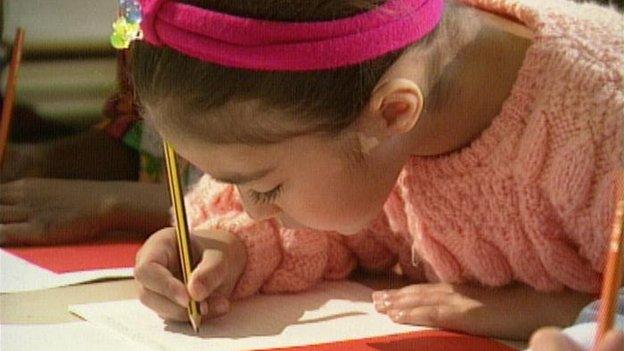How is the national curriculum changing?
- Published

The government says the new curriculum will focus on "facts"
A new curriculum will be taught in all local authority schools in England from the start of the autumn term.

What are the main changes?
The aim is to slim down the content of the curriculum in almost all subjects, though not in primary English, maths or science.
The government says the new curriculum does not tell teachers "how to teach", but concentrates on "the essential knowledge and skills every child should have" so that teachers "have the freedom to to shape the curriculum to their pupils' needs".
The new curriculum covers primary school pupils, aged five to 11, and secondary schools pupils up to the age of 14.
A new curriculum for 15- and 16-year-olds will come into force from September 2015.

Which subjects are affected?
There are changes to the content of all subjects in the national curriculum. A summary can be found on the Department for Education website. , external
In maths, children will be expected to learn more at an earlier age - for example to know their 12 times table by the age of nine
History will take a more chronological approach than under the old curriculum
In English, pupils will learn more Shakespeare and there will be more importance placed on spelling
The new computing curriculum will require pupils to learn how to write code
In science, there will be a shift towards hard facts and "scientific knowledge"

Primary pupils are expected to learn computer coding from this term

How were the decisions on the curriculum changes made?
The government appointed a panel of experts, which included subject specialists and teachers, to devise the new curriculum.
Their brief was to emulate the world's most successful school systems, including those in Hong Kong, Singapore, the Canadian state of Alberta and the US state of Massachusetts, in international tests.
The aim was to combine best international practice with best practice from schools in England.
The government says the curriculum has a strong focus on basic skills "plus real freedom for teachers to decide how best to teach".
It says it wants pupils to leave school with the knowledge and skills they need to succeed in the real world.

Does everyone agree with the changes?
Some experts have complained the new primary curriculum will require children to cover subjects, particularly in maths and science, up to two years earlier than their peers in top-performing nations.
Children in England will start looking at fractions aged five or six - but in Finland they do not start using fractions until they are about nine years old.
The history curriculum has also divided experts, with some academics welcoming it and others complaining it is list like and narrow.

Is it true many schools do not have to follow the national curriculum anyway?
Yes. Academies, state-funded schools in England outside local authority control, have significant freedoms in what they teach and do not have to follow the national curriculum.

A new curriculum for 15- and 16-year-olds is due for first teaching in September 2015

So is the national curriculum still relevant?
It is still relevant, as it will be followed in the majority of England's schools. Most primary schools in England are not academies and almost half of secondary schools are not academies. These schools are bound by the curriculum. Furthermore, academies are likely to use the national curriculum as a guide, even though they have significant freedoms in how they teach the core content.

How is the national curriculum organised?
The reorganisation does not include any changes to the four key stages in England. These are:
Key Stage 1: Ages five to seven (Years 1-2)
Key Stage 2: Ages seven to 11 (Years 3-6)
Key Stage 3: Ages 11-14 (Years 7-9)
Key Stage 4: Ages 14-16 (Years 10-11)
Key Stage 5: Ages 16-19 (Years 12-13)
The new curriculum also retains the main subject areas - English, maths, sciences, history, geography, art, modern foreign languages, et cetera.

What about pupils due to sit tests and exams at the end of the year?
Pupils in Year 2 and Year 6 will continue to be taught the previous programmes of study in English, maths and science and will sit end-of-year tests in May 2015 on these programmes.
New tests will come into force in 2016 for the current Year 1 and Year 5 pupils.
The current Year 10s and Year 11s will continue to be taught the old curriculum in English and maths, with the new curriculum due for first teaching from September 2015 to the current Year 9.

What is the history of the national curriculum?
In 1987, the then Education Secretary, Kenneth Baker, announced a statutory national curriculum in England and Wales. It was brought in in 1988. A national curriculum was introduced in Northern Ireland in 1992. Scotland has a framework that gives teachers guidance on what should be covered.

Why was the national curriculum brought in?
It was brought in because there were concerns there were inequalities in the curriculums being offered by schools. The national curriculum set out what children should be taught, with the aim of ensuring each pupil was given the same standard of education.
What subjects are currently included in the national curriculum in England?
The core national curriculum subjects are:
English
mathematics
science
physical education
The remaining subjects are:
art and design
citizenship
design and technology
geography
history
information and communication technology
modern foreign languages
music
Subjects are compulsory at various stages of pupils' school career.
For each subject and for each key stage, programmes of study set out what pupils should be taught, and attainment targets set out the expected standards of pupils' performance. Schools choose how they organise their school curriculum to include the programmes of study.

What is happening in Wales, Northern Ireland and Scotland?
Following devolution, a distinct curriculum was introduced in Wales in September 2000 and revised in 2008. Ministers recently announced a review of the national curriculum, external. A final report by the review panel, chaired by Prof Graham Donaldson, will be published in October 2014.
Scotland is currently implementing its new curriculum for excellence, external, a major educational reform aimed at providing a wider, more flexible range of subjects and courses for children and young people aged three to 18. Its stated aim is to reduce spoon-feeding to pass exams and ensure pupils leave school able to think for themselves and deal with a fast-changing world.
In Northern Ireland, a revised curriculum was introduced in 2007-08 to apply to all 12 years of compulsory education.